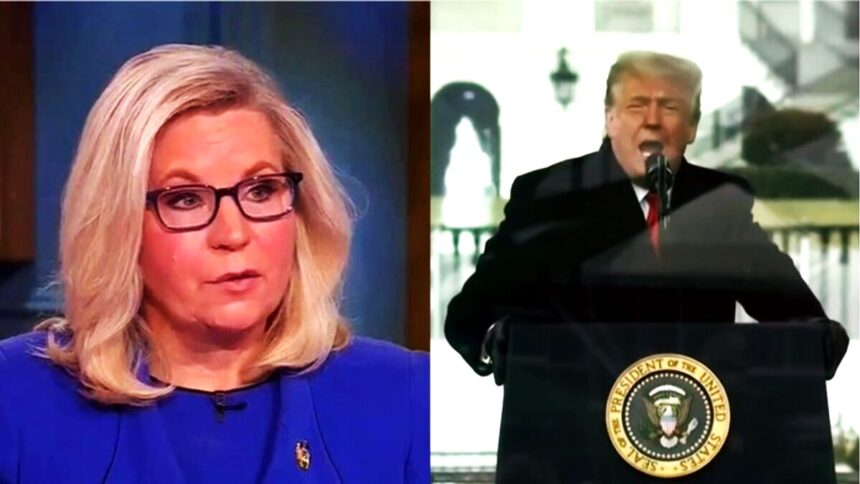In a recent campaign event in Glendale, Arizona, former President Donald J. Trump launched a personal attack on Liz Cheney, a prominent Republican critic, during an interview with Tucker Carlson. Trump’s remarks, which included violent imagery, have sparked outrage and concern about the increasingly hostile political climate as the election approaches.
A Dark Turn in Political Rhetoric
During the event, Trump described Liz Cheney as a “radical war hawk” and suggested that she should be sent into a war zone, using graphic language that implied she deserved to face the dangers of combatv. Let’s see how she feels, you know, when the guns are trained on her face, he suggested, adding, “Let’s put her with a rifle standing there with nine barrels shooting at her.” In addition to trying to discredit Cheney’s foreign policy beliefs, this statement was part of a larger pattern in Trump’s rhetoric, which has become increasingly hostile and threatening toward his political rivals.
Trump’s comments were met with immediate backlash, particularly from Liz Cheney herself. In a post on X (formerly Twitter), she responded vehemently, stating,“This is how dictators destroy free nations.” Her words served as a stark warning about the implications of such rhetoric in a democracy. Cheney, who has been vocal about her concerns regarding Trump’s authoritarian tendencies, reiterated that the nation should not be led by someone who exhibits “petty, vindictive, cruel” behavior.
“When the guns are trained on her face.” Psychopath Trump fantasizes about Liz Cheney being shot. (Video: RSBN) pic.twitter.com/ff5KrXFonQ
— Mike Sington (@MikeSington) November 1, 2024Liz Cheney History with Trump
Liz Cheney relationship with Trump has been fraught with tension, particularly after she served as the vice chair of the House committee that investigated the January 6 Capitol riot—a move that ultimately led to her ousting from Congress. Despite her longstanding Republican affiliation and being the daughter of former Vice President Dick Cheney, her vocal opposition to Trump has made her a target of his ire. Recently, Cheney has even endorsed Vice President Kamala Harris, further distancing herself from Trump and aligning with those he often ridicules.
The Broader Political Context
Trump’s remarks come at a time when the political atmosphere in the U.S. is particularly charged. With the general election looming, many are concerned about the potential for increased political violence fueled by inflammatory language. This fear is compounded by Trump’s history of divisive rhetoric; he has previously labeled his opponents with terms like “enemy from within” and “vermin,” suggesting that he views dissent as a threat that must be eliminated.
Throughout his interview with Carlson, Trump’s comments strayed beyond Liz Cheney , as he hurled insults at a range of political figures, including President Biden and Representative Adam B. Schiff. His speech was characterized by a mix of nostalgia for his 2016 campaign and hyperbolic claims regarding immigration and election fraud—topics he continues to bring up without substantial evidence.
Liz Cheney Call to Action
In her response to Trump, Cheney emphasized the danger of allowing such rhetoric to go unchecked. She highlighted the responsibility of citizens to protect democracy from those who seek to undermine it through intimidation and threats. By referencing the tactics of dictators, Liz Cheney aims to draw a clear line between democratic discourse and the kind of violent imagery Trump employed.
As Trump rallies his supporters with increasingly extreme rhetoric, Cheney’s voice stands out as a reminder of the potential consequences of normalizing such behavior in political discourse. Her statement that “we cannot entrust our country and our freedom to an unstable man who wants to be a tyrant” resonates with those who fear the erosion of democratic norms.
The Role of Media and Political Allies
During the event, Carlson played a role that has drawn criticism for allowing Trump’s unfettered commentary without challenge. This raises questions about the responsibility of media figures to hold public officials accountable for their words, especially when those words have the potential to incite violence or deepen societal divides. Carlson’s approach of providing a platform for Trump’s unrestrained rhetoric underscores the need for critical engagement in political dialogue.
A Nation at a Crossroads
As the November 5 general election approaches, the stakes are higher than ever. The escalating language from Trump and his allies signals a troubling trend that many believe could lead to further division and conflict. Cheney’s condemnation of Trump’s rhetoric serves as a crucial reminder of the responsibilities that come with political power and the importance of safeguarding democratic ideals.
In this charged environment, it remains essential for citizens to engage in meaningful discussions about the direction of the country and to hold leaders accountable for their words and actions. The clash between Trump and Cheney encapsulates a broader struggle within the Republican Party and the nation, reflecting differing visions for America’s future in a rapidly changing political landscape.
Read More : Arnold Schwarzenegger’s Presidential Endorsement: A Call for Respectful Disagreement






